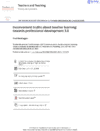Abstract
Based on recent findings about teacher learning, a critical analysis of traditional and new approaches to professional development is presented. To a large degree, teacher learning takes place unconsciously and involves cognitive, emotional and motivational dimensions. Moreover, teacher learning takes place at various levels. Although these insights may be inconvenient truths to policy-makers, empirical evidence is presented showing that approaches building on the multi-level and multi-dimensional nature of teacher learning are effective at influencing teacher behaviour. Hence, in teacher learning, the connection with the person of the teacher is crucial. Practical consequences for professional development are discussed.



Responses